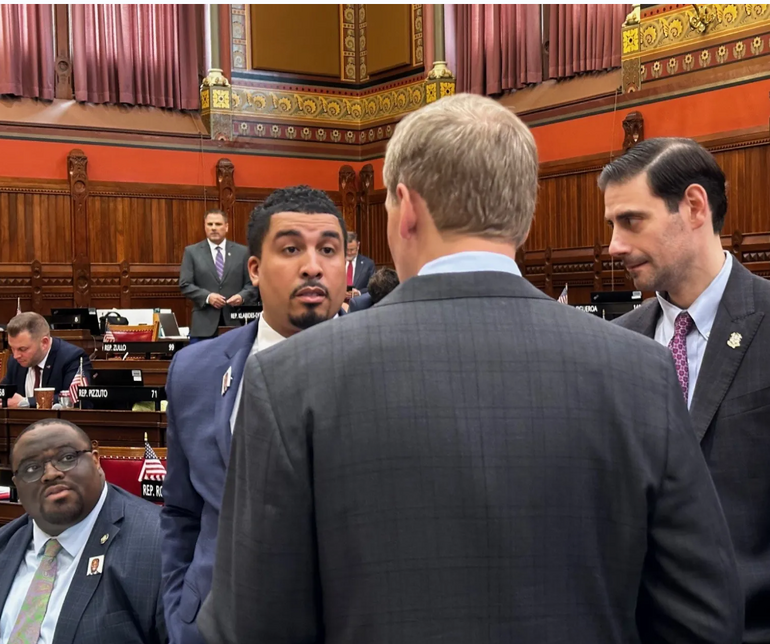Processing Your Payment
Please do not leave this page until complete. This can take a few moments.
-
News
-
Editions
-
- Lists
-
Viewpoints
-
HBJ Events
-
Event Info
- 2024 Economic Outlook Webinar Presented by: NBT Bank
- Best Places to Work in Connecticut 2024
- Top 25 Women In Business Awards 2024
- Connecticut's Family Business Awards 2024
- What's Your Story? A Small Business Giveaway 2024 Presented By: Torrington Savings Bank
- 40 Under Forty Awards 2024
- C-Suite and Lifetime Achievement Awards 2024
- Connecticut's Health Care Heroes Awards 2024
-
-
Business Calendar
-
Custom Content
- News
-
Editions
View Digital Editions
Biweekly Issues
- April 29, 2024
- April 15, 2024
- April 1, 2024
- March 18, 2024
- March 4, 2024
- February 19, 2024
- February 5, 2024
- January 22, 2024
- January 8, 2024
- + More
Special Editions
- Lists
- Viewpoints
-
HBJ Events
Event Info
- View all Events
- 2024 Economic Outlook Webinar Presented by: NBT Bank
- Best Places to Work in Connecticut 2024
- Top 25 Women In Business Awards 2024
- Connecticut's Family Business Awards 2024
- What's Your Story? A Small Business Giveaway 2024 Presented By: Torrington Savings Bank
- 40 Under Forty Awards 2024
- C-Suite and Lifetime Achievement Awards 2024
- Connecticut's Health Care Heroes Awards 2024
Award Honorees
- Business Calendar
- Custom Content
CT paid sick leave expansion passes House; heads to Senate next
 MARK PAZNIOKAS / CT MIRROR
From left, Reps. Derell Wilson and Manny Sanchez of labor committee listen to House Speaker Matt Ritter and his counsel, Ricky Baltimore.
MARK PAZNIOKAS / CT MIRROR
From left, Reps. Derell Wilson and Manny Sanchez of labor committee listen to House Speaker Matt Ritter and his counsel, Ricky Baltimore.
Thirteen years after Connecticut required a narrow slice of private-sector employers to offer five paid sick days annually, the House voted 88-61 on Wednesday for legislation that gradually would transform that limited mandate into a nearly universal benefit by Jan. 1, 2027.
Passage of the original law in 2011 was of greater political than practical significance: The mandate was the first of its kind in the U.S., a victory for the Working Families Party and the newly elected Gov. Dannel P. Malloy, the state’s first Democratic governor in 20 years.
But the majority of employers and employees were exempt. The law only covered certain employers with 50 or more workers, limited to a list of specific retail and service occupations. Seasonal employees were not covered, nor manufacturers or YMCAs and YWCAs — exemptions necessary for passage.
House Bill 5005, the measure approved Wednesday and sent to the Senate for certain passage, would repeal most exemptions and lower the threshold for coverage from companies with 50 or more employees to those with 25 or more on Jan. 1, 2025; to 11 in 2026; and to one in 2027.
The bill does not require additional time off at workplaces that already offer 40 hours of paid time off, regardless of whether it is classified as vacation, personal days or sick time.
“So I just think this actually ends up covering a very small subset of persons, mostly part-time people working at very large, fast-food type establishments, chain type establishments — not the good local employer,” said House Speaker Matt Ritter, D-Hartford.
House Minority Leader Vincent J. Candelora, R-North Branford, said House Democrats were misleading the public and their own bloc of moderate members in downplaying the bill’s impact, and suggested they would face a backlash. The moderates had convinced Ritter not to call a vote last year.
Nine moderate Democrats joined 52 Republicans in opposition Wednesday. There were no GOP votes in favor.
“This is the policy that Democrats want to eat, or want to pass, and they could choke on it. It’s not something that is sustainable for the state of Connecticut. It’s unfortunate it’s being downplayed as no big deal, when in fact it is. This is going to be a problem for every small business,” said Candelora, who owns a sports and fitness complex.
But the margin of victory Wednesday was greater than the vote in 2011 for a measure that was more symbolic. The vote then was 76-65, with 76 being a bare majority in the 151-seat House. Democrats held 99 seats in 2011, one more than today.
Whatever the ultimate reach of the new bill, the debate underscores the fundamental difference among Democrats and Republicans over the role of government in defining labor-management relations and whether such measures detract from Gov. Ned Lamont’s efforts to burnish Connecticut’s reputation as a place to do business.
“Ten years ago, Connecticut was the laughingstock, the butt of every joke in the country — some of the worst economic policies going, massive tax increases, massive employer mandates,” said Rep. Dave Rutigliano, R-Trumbull, a restaurant owner. “Do we really want to go back there? What message are we sending to the rest of the country?”
Lamont, a Democrat and former business owner who casts himself as a business-friendly leader, endorsed a similar bill last year after it cleared the Senate, only for it to die without a vote in the House. With the passage Wednesday in the House, the path to it becoming law is smooth.
The COVID-19 pandemic demonstrated the need to establish policies allowing sick workers to stay home without financial penalty, said Lamont, who succeeded Malloy five years ago.
“The legislation approved by the House today strikes an appropriate balance between protecting our workforce while also enacting safeguards for small businesses to ensure that this right is not being misused,” Lamont said. “I applaud the House on their vote today and I encourage the Senate to approve it so that I can sign it into law.”
House Majority Leader Jason Rojas, D-East Hartford, expressed a similar sentiment in closing remarks.
“People no longer want somebody who’s sick coming to work. People who are sick themselves — I, one of them — no longer want to go to work ill if they can avoid it,” Rojas said. “People shouldn’t have to choose between being sick, making other people sick, and losing out on compensation.”
Under the bill, employees would accrue one hour of paid time off for every 30 hours worked up to a maximum mandated benefit of 40 hours of paid time off in a year. The benefit would become available after the 120th calendar day of employment, and unused time could be carried over to the next year.
Seasonal workers still would be exempt from the mandate, as would unionized construction workers. Tipped workers at restaurants, who make a lower minimum wage than other occupations, still would be allowed to swap shifts and work for tips, rather than accrue time off at a low minimum wage.
More than a dozen states have passed sick days mandates since 2011.
Most of the nearly six-hour debate Wednesday featured Rep. Steve Weir of Hebron, the ranking Republican on the Labor and Public Employees Committee, quizzing the committee’s Democratic co-chair, Rep. Manny Sanchez of New Britain, on the fine details of how the bill be implemented and enforced.
At least twice, Sanchez paused to consult with colleagues. Ritter and his chief counsel, Ricky Baltimore, advised him on the floor at one point.
Weir, Candelora and other Republicans said tracking employee hours would be an accounting headache and another expense to businesses.
“I think that’s a disingenuous argument,” said Sarah Ganong, the political director of the Working Families in Connecticut. “In this day and age employers have common software — everybody uses it — tracking how much you’re paying your employees and how much they are working.”
But Ganong readily agreed with Candelora on one point: Her group considered the bill a priority, and it was open to backing primary challenges to Democrats who opposed the measure.
“That’s accurate,” she said.
The Working Families and She Leads Justice, which formerly was known as the Connecticut Women’s Education and Legal Fund, led the lobbying effort for passage. Ganong and Janée Woods Weber, the executive director of She Leads Justice, watched from the House gallery.
The groups’ members and supporters cheered as they exited the House gallery.
“We did it,” Weber said.

2022 Giving Guide
This special edition informs and connects businesses with nonprofit organizations that are aligned with what they care about. Each nonprofit profile provides a crisp snapshot of the organization’s mission, goals, area of service, giving and volunteer opportunities and board leadership.
Learn more
Subscribe
Hartford Business Journal provides the top coverage of news, trends, data, politics and personalities of the area’s business community. Get the news and information you need from the award-winning writers at HBJ. Don’t miss out - subscribe today.
Subscribe
2024 Book of Lists
Delivering Vital Marketplace Content and Context to Senior Decision Makers Throughout Greater Hartford and the State ... All Year Long!
Read Here-
2022 Giving Guide
This special edition informs and connects businesses with nonprofit organizations that are aligned with what they care about. Each nonprofit profile provides a crisp snapshot of the organization’s mission, goals, area of service, giving and volunteer opportunities and board leadership.
-
Subscribe
Hartford Business Journal provides the top coverage of news, trends, data, politics and personalities of the area’s business community. Get the news and information you need from the award-winning writers at HBJ. Don’t miss out - subscribe today.
-
2024 Book of Lists
Delivering Vital Marketplace Content and Context to Senior Decision Makers Throughout Greater Hartford and the State ... All Year Long!
ABOUT
ADVERTISE
NEW ENGLAND BUSINESS MEDIA SITES
No articles left
Get access now
In order to use this feature, we need some information from you. You can also login or register for a free account.
By clicking submit you are agreeing to our cookie usage and Privacy Policy
Already have an account? Login
Already have an account? Login
Want to create an account? Register
Get access now
In order to use this feature, we need some information from you. You can also login or register for a free account.
By clicking submit you are agreeing to our cookie usage and Privacy Policy
Already have an account? Login
Already have an account? Login
Want to create an account? Register






0 Comments